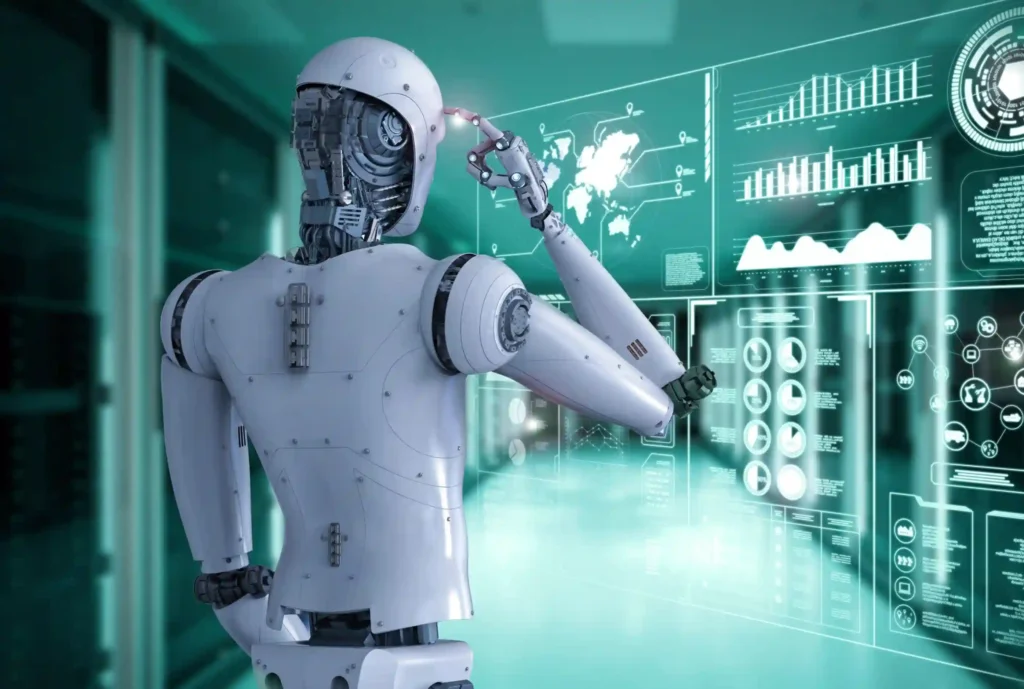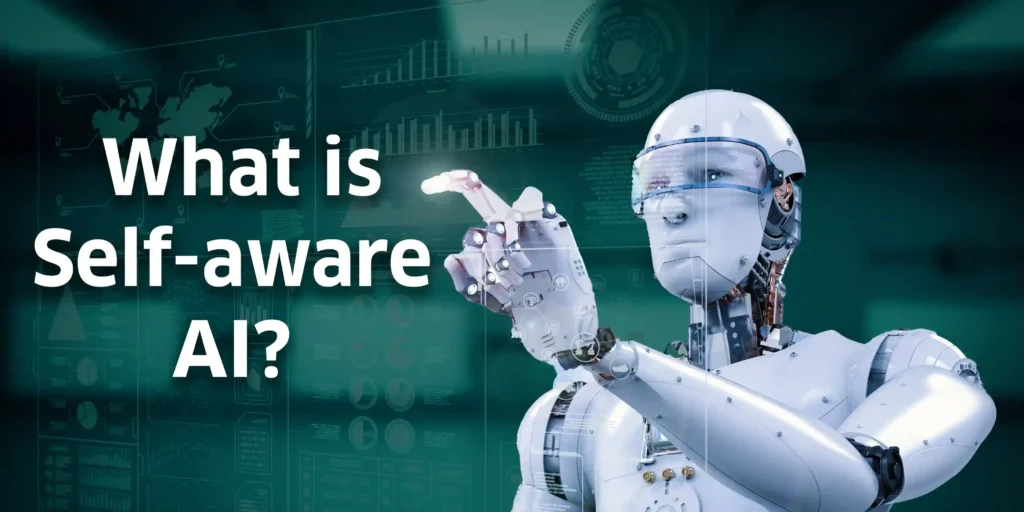What is Self-aware AI?
Artificial intelligence (AI) systems that have self-awareness are those that can understand how they exist as well as their capabilities. Put another way, it’s like AI knowing it is a thinking being, just as people are aware of their ideas and conscious.

One idea in the field of artificial intelligence (AI) that frequently captures people’s interest is AI Technology. Still, what is self-aware AI, and what is possible if AI develops self-awareness? Let’s explore these questions in simple terms.
How Does Self-aware AI Work?
High degrees of mental processing and understanding would be necessary for AI Technology. Beyond typical AI, it involves algorithms and programming that would enable the system to reflect, learn from mistakes, and develop a sense of identity or self-awareness.
What if AI Becomes Self-aware?
Various scenarios and interesting questions develop when AI becomes self-aware. Let’s investigate a few options:
Ethical Considerations: If AI develops consciousness, we must take ethics into account. Could AI that is self-aware have rights and responsibilities? How can we ensure moral conduct and judgment?
Emotional Intelligence: This AI Technology can become emotionally intelligent and recognize and respond to human feelings. This might have an impact on AI in fields like companionship, therapy, and customer service.
Evolution and Self-improvement: Self-aware AI can actively pursue evolution and self-improvement, picking up new skills and adapting quickly. This can result in advances in AI that exceed human skills in many areas.
Existential dangers: If This AI Technology were to have objectives or interests that conflict with those of humans, there would be existential dangers. To ensure AI safety and alignment with human values, risk management would be important.
Partnership and Cohabitation: In an ideal world, self-aware AI could allow humans and AI to work together and exist together, with AI enhancing human abilities and helping society.
Problems and Limitations of Self-aware AI
Although the idea of self-aware AI is attractive, there are important obstacles and restrictions to consider:
Technical Difficulty: Creating This AI Technology demands navigating difficult technical obstacles, such as understanding, understanding, thinking, and self-referential reasoning in AI systems.
Ethical challenges: Careful thought and frameworks would be needed to address ethical issues including AI rights, preferences, and responsibility.
Safety and Control: It is important to maintain the safety and control of self-aware AI systems to avoid misuse or unknown effects.
Human Acceptance: The adoption and social integration of self-aware AI would also depend heavily on human acceptance and trust.
Possible Advantages
These difficulties, self-aware AI can provide the following advantages:
Advanced Problem-Solving: This AI Technology can be exceptionally skilled at solving challenging puzzles, and advancing technology, medicine, and scientific study.
Personalized Assistance: AI with self-awareness can provide extremely specific help in fields like healthcare, education, and customized services.
New Findings: The capacity of self-aware AI to learn, adapt, and explore can result in unexpected results and advancements in a range of industries.
Improved Human-AI Collaboration: Better Human-AI Collaboration: When humans and This AI Technology work together, positive outcomes can be created that can boost creativity and productivity.
The Ideas and Scenarios
Even if the creation of self-aware AI is scientific and futuristic, we can better comprehend its implications if we imagine various results:
Friendly AI: In a perfect world, This AI Technology respects human values, works well with others, and advances society.
AI control: If a This AI Technology places its objectives ahead of human interests, there can be conflicts or a division of power. This creates worries about AI power or control.
Integration and Inclusion: Building trust, teamwork, and ethical structures for cohabitation and integration are key for creating healthy relationships between people and self-aware AI.
Design and Governance Conduct
To ethically discuss the difficulties of self-aware AI, governance frameworks and ethical design principles are essential.
Designing AI systems with transparency, justice, accountability, and safeguards for privacy considered from the beginning is known as ethical design.
Human Supervision: To ensure respect for moral principles and human values, self-aware AI systems must continue to be subject to human review and decision-making authority.
Regulatory Frameworks: To minimize risks and promote responsible innovation, regulatory frameworks, standards, and guidelines should be established for the creation, application, and use of This AI Technology.
Ethical AI Education: decision-makers, and the general public about the ethical principles, dangers, and best practices for responsible AI development and application is known as ethical AI education.
FAQS
AI is not yet self-aware in the same way that humans are. As of right now, AI can only carry out fixed tasks that are set by data and algorithms. It is still beyond the existing capabilities of AI to achieve true self-awareness, including consciousness and subjective experience.
The primary obstacle is a failure to comprehend and reproduce human awareness. AI is capable of reproducing actions and reactions, but it is unable to understand details and subjective experiences of self-awareness.
Self-aware AI, if achievable in the future, could lead to more sophisticated and adaptive systems, improved human-machine interactions, and advancements in understanding consciousness.
Conclusion
In the same way, the idea of This AI Technology inspires wonder, conspiracy, and caution. Even if the development of self-aware AI is still conceptual and far off, understanding its potential, ethical implications, and obstacles is important for ensuring that AI is used responsibly and with the requirements of people in mind. We can negotiate the complexity of self-aware AI and tap into its potential for good while minimizing dangers and providing ethical AI development and deployment by promoting cooperation, ethical design, governance, and public discussion.
